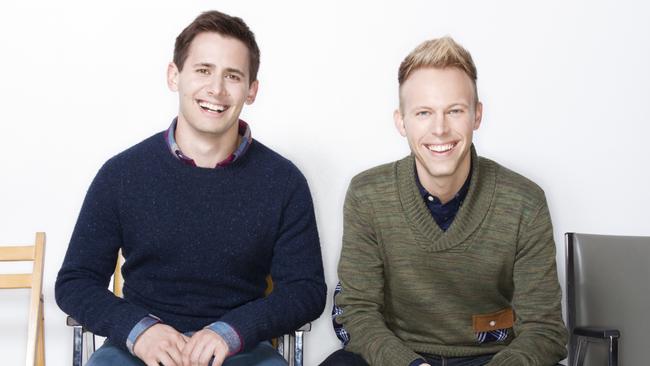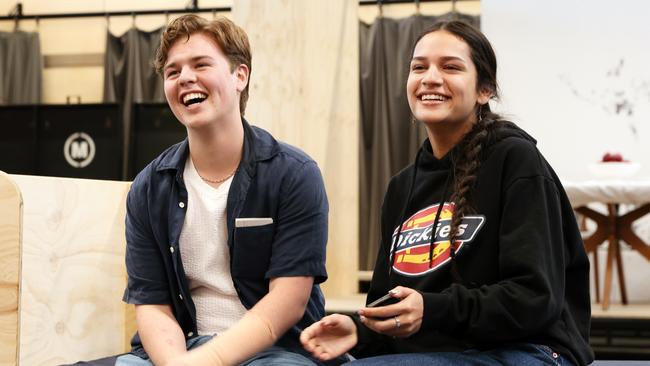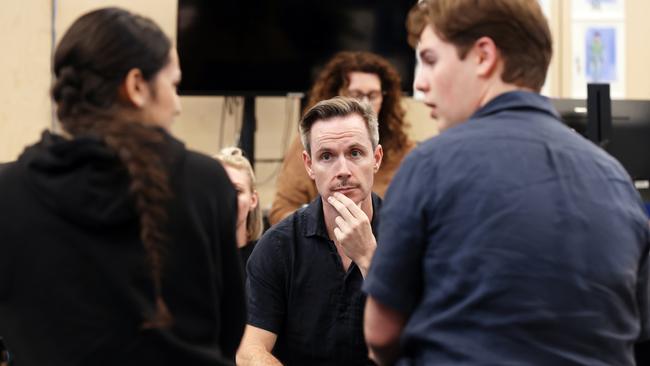Tony Award-winning musical Dear Evan Hansen explores epidemic of loneliness among younger generations
When it comes to musicals, Benj Pasek and Justin Paul’s edgy approach leaves the boys gets/loses/wins back girl formula in the dust. We sat down with the pair to discuss their Tony Award winning musical, set to premiere in Australia.

Simon and Garfunkel. Rodgers & Hammerstein. Pasek and Paul. Who? I hear you ask.
The American songwriting duo Benj Pasek and Justin Paul may not have attained the household-name status of the former composers, but they are certainly on the right track.
In September, they joined the elite EGOT club – the small group of artists including Liza Minnelli, Barbra Streisand and James Earl Jones who have taken out a rare quadrella: Emmy, Grammy, Oscar and Tony awards.
And they are not yet 40.
The 39-year-olds achieved EGOT status when they snaffled the 2024 Emmy for Outstanding Original Music And Lyrics for their tongue-twisting patter song, Which of the Pickwick Triplets Did It? They created this fiendishly clever tune (along with Marc Shaiman and Scott Wittman) for Steve Martin, star of the Disney series Only Murders in the Building.
When it comes to musicals, the pair’s edgy approach leaves the boys gets/loses/wins back girl formula in the dust.
One of their biggest hits, the musical Dear Evan Hansen, is set to premiere in Australia, and it centres on a teenage misfit who – inadvertently at first – uses an acquaintance’s sudden death to gain social acceptance. This unconventional musical set Broadway alight in 2015 and subsequently took out six Tony awards, including best musical.
Pasek and Paul, who “trauma-bonded” at university over their lame ballet and acting skills, scored a second Tony Award in 2022 for their producing role on A Strange Loop, a Pulitzer-Prize winning musical about a black gay man struggling to write a musical about ... a black gay man.
The duo also compose for the big screen and are best known for winning a 2016 Oscar for their La La Land theme, City of Stars. Two years later, they took home their second Golden Globe for the original song This Is Me, from The Greatest Showman, a biographical musical about the life of PT Barnum which starred Hugh Jackman.
In a Zoom interview with Review, this understated pair talk about the risks they took when they created Evan Hansen, the “epidemic” of loneliness among their generation and how technology has, paradoxically, left us feeling more disconnected.

Is it true that Dear Evan Hansen was inspired by the suicide of a student at Benj’s high school?
Benj Pasek: It’s ambiguous as to whether or not it was a suicide, but a student passed away at the school I attended and after his death, many people who didn’t know him very well posthumously acted as if they were very close with him. That was the inspiration, along with a few other touch points in both of our lives, for Dear Evan Hansen.
What gave you the idea for your anxious, socially awkward protagonist Evan Hansen, who uses the death of another student for his own social advancement?
Justin Paul: When we were initially jumping off the (real-life) event that Benj was talking about, we looked at that fascinating situation where we found people, especially people in our generation, having this need to be close to or feel associated with tragedy or grief, and finding an odd connection in it.
We found it fascinating and sad, maybe even off-putting. We thought it would be something meaty and something that could be really interesting to delve into and potentially to musicalise.
So despite his missteps, the musical’s titular protagonist becomes a potent symbol of younger people’s social isolation in our hyper-connected world?
Justin: In partnership with Steven Levenson, the book writer of our show, the way to approach it we found, was (to ask): Who might be the best representative for our collective loneliness; the best representative for the extraordinary disconnectedness that our society, particularly our generation, has found itself in?
Why do you think so many young people today are lonely?
Justin: Connected as we are digitally, we are so very disconnected socially. There is a loneliness epidemic. You know, people are feeling more alone and less connected to society and community than they ever have before. So we felt with Evan’s social anxiety, all of the foibles and faults that he had, he was a perfect representative of that loneliness that we were looking to explore.
Dear Evan Hansen resists portraying a suspected teen suicide or grief in a sentimental way. In its review, The Daily Beast wrote that your songs in the musical “are about loss, self-delusion, and the construction of comforting fantasies and platitudes’’. Did that lack of sentimentality seem like a risk?
Benj: What’s the definition of sentimental? Even during the development of the show, two of my close friends took their own lives. So I think that it’s very real to my experience: in my high school, there were several kids who that (suicide) happened to and it came about through a sense of disconnection and loneliness and a desperation to be connected. I don’t think we’re trying to glamourise it (suicide) in any way.
Dear Evan Hansen won six Tony Awards including best musical and the reviews were ecstatic, with The New York Times describing the show as “a breathtaking knockout”. Were you surprised by the cult phenomenon the musical became?
Benj: We were really moved to see that something that felt incredibly personal to us had more of a universality than we had originally anticipated. There’s some projects that you work on – where you’re adapting a famous movie, or you’re doing something that everyone tells you is gonna be a hit – but this was a very personal story. It felt like it was ripped from our own lives, because in many instances, it was. And so there was something really surprising and beautiful about how something we had a very, very personal connection to had a universal resonance.
When we opened it out of town, we thought this will be our own show that we’ll really love and that hopefully a couple of people will see in Washington DC. I think because people felt like they had a personal connection to it, that was really the engine behind its path to Broadway and now its path to you in Australia.

You started writing songs together while you were at the University of Michigan studying acting. You have said you were “terrible actors” and bad dancers, so you ended up “trauma bonding” in university ballet classes?
Justin: Confirmed! (laughing)
Benj: (groaning) That is true.
Did you then switch to writing songs because the acting and dancing subjects just weren’t doing it for you?
Benj: Justin had been a musician for a really long time and I had written songs for a really long time. And when you’re in high school, you’re only given one path if you want to pursue the creative arts. You know, really, it’s boiled down to: be an actor.
Justin: (Laughs) There’s not an option to be a casting director or producer when you’re 13.
Ultimately, those university acting classes held valuable lessons for you as songwriters. What were they?
Benj: Those elements that we were learning about became so informative to us about how to theatricalise the songwriting process. What does an actor need to perform a theatrical song? You know, what’s my motivation? What are the obstacles that are in my way?
We began to still call that up and reverse engineer and put it into song, and we discovered that we loved writing songs. And so from 18 on, meeting each other and also being in an environment where we were supported by the professors and the community around us, we pursued something that there wasn’t a major for at our college.
You have been working together for two decades. Are there times when you contend with serious niggle, or creative differences?
Justin: Definitely, we have had creative differences over the course of our collaboration. Now, we would count it as one of the assets of our collaboration. We are quite different people, and we often find ourselves aligned, but also approaching things often in different ways, and certainly have creative differences and disagreements.
But we very much appreciate the creative friction that creates and the ultimate result of that: we end up landing somewhere that we never would have otherwise.
We always talk about it, that instead of meeting in the middle, we sort of pull each other forward to somewhere we never would have landed had the other not pushed and pulled.
The Sydney Theatre Company-Michael Cassel production will be the first Australian production of Dear Evan Hansen since the show’s Broadway debut in 2015. How did you come to grant the rights to Cassel and the STC?
Benj: We’ve known Michael for a very long time. While we don’t know the creative team involved intimately, in Australia, Michael’s reputation speaks for itself. We also know him personally, and feel very excited that he is the man and the company behind bringing Evan Hansen to Australia. There’s no one that we would have more faith than him to get it right.
In 2010, when you were still being described as songwriters to watch, you performed at the Adelaide Cabaret festival. How would you describe that performance?
Benj: We were just two guys at a piano singing our earlier work.
In 2021, a film version of Dear Evan Hansen was released and critics panned it. Why do you think there such a big discrepancy between the critical adulation for the musical and the drubbing the film received?
Benj: Film is a very different medium. When you’re using musical theatre to get inside someone’s head, you get to live in a non-reality that we accept in the theatre. And so certain elements translated, certain others might not have. But we really feel lucky that the story got to reach more people.
A novelised version of the musical, also called Dear Evan Hansen, was published in 2019 and you became NYT best-selling authors. Was that an unexpected career pivot?
Justin: That was definitely an unexpected pivot! (laughs). It was a really sort of wonderful idea that came about which had not really occurred to us.
We got to collaborate with a wonderful writer who really know knew what he was doing, Val Emmech. Val really led the way.
Growing up, you read the novelisation of movies, and it’s like, take the plot of the movie, and that’s it, whereas this was a lovely and beautiful experience, because there was a real investment on Val’s part. So taking the characters to places they hadn’t gotten to go to in the show. That was an unexpected twist in the road and a beautiful one.
You have very full dance cards: You are contributing new songs to Disney’s forthcoming live action musical Snow White, and hoping to see The Greatest Showman and La La Land transfer to the stage. How are those screen to stage adaptations shaping up?
Benj: We’re very excited about those becoming stage properties. We never anticipated that the films would have the success that they had and that they’ll be able to be enjoyed in a theatrical context is really thrilling for us. We’re working away and trying to make them happen.
However, shows are a very, very long process – Dear Evan Hansen took us between eight and 10 years to really bring to Broadway in its full version, so we’re trying to dedicate the time and care that both La La Land and The Greatest Showman need to transition.
What was the biggest challenge when it came to creating Dear Evan Hansen’s songs and lyrics? Was it striking the right tone?
Justin: Yeah, wonderful leading question. It was striking the right tone. To throw some credit again to Steven Levenson, our book writer, we initially approached Steven because we felt his writing was very contemporary, authentic. Once he began writing the script – informed by many, many conversations and a year of brainstorming – it began to feel very real and very authentic.
Our immediate concern became that we might ruin the authenticity of this beautiful play by writing songs that might trample on it. That was the challenge – to not interrupt this true-life tone of the show.
While we take the audience to emotional places, and they are touching on some darker elements, we’re also giving them an experience that feels accessible and uplifting as well.
Dear Evan Hansen opens on October 18 at the Roslyn Packer Theatre, Sydney.







To join the conversation, please log in. Don't have an account? Register
Join the conversation, you are commenting as Logout